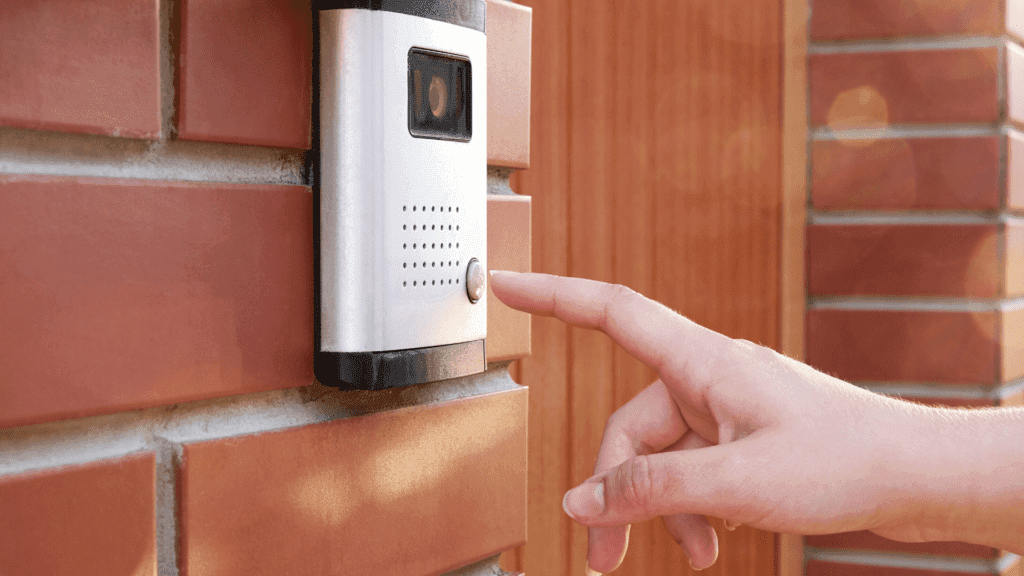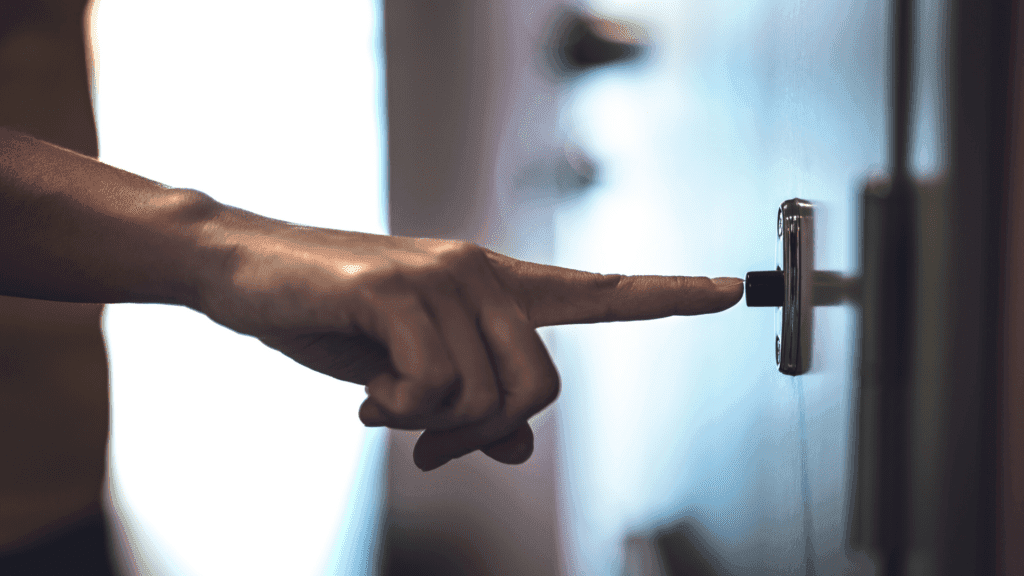If you have no idea who the “NHK guy” is and why you’d want to get rid of them, consider yourself lucky! For those of you who live in Japan, you’ve probably encountered the NHK guy knocking on your door at least once, asking for their NHK reception fee. In this blog post, I’ll explain who the NHK guys are, whether or not you’re supposed to give them the NHK reception fee, and how to effectively get rid of these NHK guys.
One of the best ways to explore Tokyo is to visit the local areas and immerse yourself in the local culture. If you want to explore local areas, we have created scavenger hunt adventures personalised to your interests, filled with fun facts, clues and puzzles. If you’re curious, you can check out the games here! Check out the Flip Japan Games here! |
Who are the NHK guys?

They’re typically dressed in black suits (though that doesn’t say much in Japan, since most working people wear black suits), with a badge around their necks and a clipboard with a contract for you to sign. The most important to know about these guys is that they are persistent.
They’ll ring your doorbell, knock on your door, leave letters in your mailboxes, all with the purpose of getting you to pay for NHK services and/or to sign a binding contract with NHK. These guys are not NHK employees themselves, but outsourced and hired from other companies by NHK. Based on their obnoxious persistence, they may be working on commission, though don’t quote us on that.
If you happen to see someone knocking on doors, ringing doorbells, and being turned away, they are probably NHK guys.
Am I supposed to pay for the NHK reception fee?

NHK is the national public broadcasting organisation (Nihon Hōsō Kyōkai, 日本放送協会). As advertising and commercials are prohibited on their channels, they have to find other sources of revenue. This is where Article 64 of the Broadcast Law comes into play. It states, on the official NHK website:
Article 64
Any person who has installed receiving equipment capable of receiving the broadcasting provided by NHK shall conclude a contract with NHK with regard to the reception of its broadcasting.
To be clear, you only have to pay if you have a contract with NHK. According to this law, you must have a contract with NHK if you have a TV, even if you never watch their channels. Once you sign the contract, NHK can sue you for breach of contract if you refuse to pay.
But here’s the loophole: there are no penalties for not signing with NHK in the first place. Though Article 64 says you have to, it lists no penalties or charges for if someone refuses to obey. So while Article 64 is a law, it’s somehow also not, and this ambiguity is what makes this whole issue so confusing and frustrating.
If you haven’t already signed the contract, NHK can’t technically force you to pay when they show up at your doorstep. They’re just very persistent and will repeatedly tell you you have to, even if you tell them you don’t have a contract with NHK.
Most people eventually pay just to get them to leave. For some who only get the NHK guy once or twice a year, paying them may be the easiest and most straightforward way out. For others who get them often, the costs add up. (More info in Japanese: Homemate)
How do I pay for the NHK reception fee?

If you do watch NHK channels and you want to do the right thing and pay, you can either wait for the NHK guy to show up again and tell them you want to sign a contract, or you can register through their homepage. Keep in mind that online registration is available only in Japanese. However, they do have instructions on how to activate your account in a few other languages. (Yahoo, 2019)
How much do I need to pay?

The NHK reception fee varies depending on your contract, and there are three types:
- Basic Broadcast Contract (chijō keiyaku, 地上契約) for TVs that only receive basic ground cable broadcasting.
- Satellite Broadcast Contract (eisei keiyaku, 衛星契約) for TVs that receive both basic ground cable broadcasting and satellite services.
- Special Contract (tokubetsu keiyaku, 特別契約) for TVs that receive only satellite broadcasting due to natural terrain obstructions, or TVs on trains.
On average, a Tokyo resident will pay 13,600 yen (USD$126) every year (Easy Life Japan, 2019) in NHK fees.
There are three payment methods. You can pay via monthly bank transfer, automatic credit card transfer and automatic bank transfer. You can pay every month, every 2 months, every 6 months or every 12 months.

Discounts and exemptions

Families, students and people with disabilities are sometimes eligible for discounts or total exemptions.
Full exemption
- Public assistance recipient
- Persons with disabilities who are exempt from municipal tax
- Residents of social welfare facilities
- Victims of disasters
- Students living in separate residences from their families who receive scholarships
- Social welfare facilities
- School (classrooms such as elementary school, junior high school, kindergarten, special needs school)
Discounts
One of the following applies if you are the head of household and a subscriber
- Visually and hearing impaired persons (those who have a physical disability certificate)
- Severely disabled
- Severe war illness
How do I avoid paying the NHK reception fees?

What might not work
1. Speak in English
Previously, many foreigners would speak English and say they didn’t speak Japanese (even if they did) to get rid of the NHK guys. In the past, when faced with non-Japanese-speaking foreigners, the NHK guy would usually leave instead of staying and playing charades.
But, that doesn’t always work anymore. Nowadays, NHK guys speak enough English to convey their messages, especially in the big cities, or they may even whip out their phone and use Google Translate. Some even come prepared with English pamphlets and contracts, or may leave and return with an English-speaker.
2. Saying you don’t own a TV
This is the oldest trick in the book to get rid of NHK guys and was basically the default response for most Japanese people (which isn’t impossible considering some Japanese people live in very small and cramped apartments). However, there were cases of NHK guys asking to come into people’s homes to check for themselves. This doesn’t happen as much (or at all, hopefully) anymore.
Instead, the NHK guy will now tell you that you might get a TV in the future, so you may as well sign the contract now. They may also tell you you don’t need a TV to watch NHK programs, since they’re accessible online through your computer or phone. While this is true, there are different laws regulating the use of computers and smartphones.
Again, unless you actually want to watch their programs, DO NOT sign a contract. DO NOT give them your bank details. As long as you don’t have a contract with NHK, they can’t take you to court for not paying. If you give in and sign a contract, say goodbye to a couple thousand yen every month.
3. Telling them it’s an Airbnb

Story time! When one of our FLIP Team members first moved to Tokyo, she stayed in an Airbnb while she figured out more permanent accommodation. Unfortunately, a very persistent NHK guy showed up during her two-week stay there.
Though she explained to him that she didn’t live there permanently and that it was just an Airbnb, he repeatedly told her she had to pay as there was a TV in the apartment, and that she could try to get the money back from the Airbnb owners afterwards.
The best ways to avoid the NHK guy

If you don’t already have a contract with NHK and you don’t plan on ever watching NHK channels, then here are some ways to avoid the NHK guy. Keep in mind that if you do watch NHK channels, we believe it’s only right for you to pay the fees so NHK can continue producing the shows you enjoy so much.
1. Ignore the NHK guys
Honestly, the best way to get rid of NHK guys is by ignoring them when they show up at your doorstep. If you look through your peephole or intercom and see someone who fits the description we mentioned earlier, ignore them. This way, you will avoid a long and aggravating conversation where they may try to use legal jargon to trick you. It’s just a waste of time and energy, really.
If you were expecting an Amazon or UberEats delivery and you mistakenly answered the door to an NHK guy, try the following techniques.
2. Say you don’t live there

Tell them you don’t live in the apartment. Tell them it belongs to a friend or relative of yours who’s overseas and you’re just house-sitting, or checking in to take care of the plants or pets. If you convince them with a solid story, they probably won’t persist as they don’t want a contract with you, the visitor, but a contract with the homeowner. Unfortunately, this doesn’t always work, as evidenced by the Airbnb story above, and they’ll still insist on a payment for that month if not a contract.
Be warned that this is just a temporary solution. They will mark the apartment for a second round of visits in hopes of catching the “real” homeowner.
3. Speak in another language other than English or Japanese
If you happen to speak another language besides English or Japanese, give that a go. They may still try to use Google Translate, but if you’re lucky, they might not recognise what language you’re speaking and won’t know what language to translate to. Is it French, Spanish, Dutch, Italian, German? Hopefully it’ll all sound the same to the NHK guy and he’ll leave, confused.
4. Play dumb
If you have some acting skills up your sleeves, you can act dumb when they come knocking on your door. You can ignore their questions, not respond, or play the part of a clueless, non-responsive character. In my experience, this works not only with NHK guys but also in a lot of other scenarios when you just can’t be bothered to deal with a situation.
5. Tell them to go away

If you’re unlucky and you have a persistent NHK guy who constantly rings the doorbell or who’s testing out all the language options on Google Translate, very firmly tell them to go away: kaette kudasai (帰ってください), literally translated as “go home” and understood to mean “go away”. They have no legal rights to come into your home or force you to stay in an unwanted conversation. Tell them to leave and shut your door. They might continue ringing the doorbell for a while, but do your best to ignore it and they’ll probably leave in a while—they’ve got more doors to ring, more people to piss off.
—
If you are frustrated by the NHK guys and/or the grey area in the broadcast laws, you are not alone; they aggravate not just foreigners but also the local Japanese population. There’s even a political party whose sole goal is to abolish NHK guys harassing people, the Party to Protect the People from NHK (NHKから国民を守る党, NHK kara kokumin wo mamoru tō).
If you actually do want to watch NHK but don’t want to pay too much, see if you are eligible for discounts or exemptions. If you don’t watch NHK at all and don’t want to pay the fees, try one or two of the methods above.
Share with us your experiences with the getting rid of NHK guys in the comments below! If you have any other methods to get rid of them, let us know in the comments as well!
Find out more about Japan travel here: Shopping in Japan, the best souvenirs to buy in Japan, nature in Japan, camping in Japan, overnight & day trips from Tokyo, Top museums to visit in Tokyo, Local neighbourhoods in Tokyo and beaches near Tokyo.
Stay tuned for more information about Japan travel, Japanese culture, moving to Japan, living in Japan, Japanese language and more.


Recent Comments